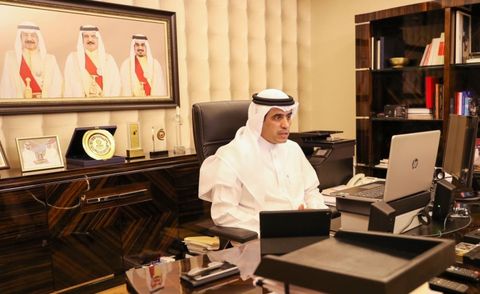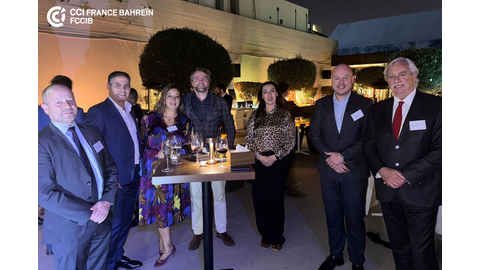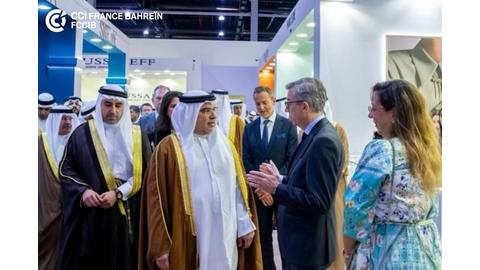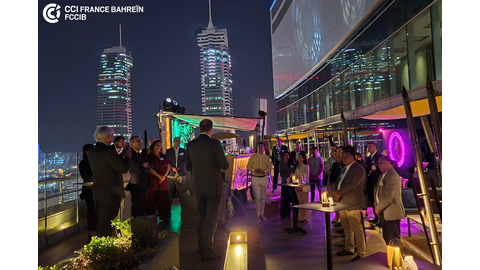Bahrain speaks in a conscious, confident voice that reflects society's nature, culture

Manama, May 4 (BNA): Minister of Information Ali bin Muhammad Al Romaihi has praised the professional response of the national media in Bahrain to the coronavirus pandemic and its great role in raising awareness among the various communities.
During an online media conference organized by the National Communication Center, the minister said that the Bahraini media is conscious and confident and reflects the nature of the local society and culture.
Such attributes have empowered it to tackle with confidence the distortion campaigns and hate speech by external entities using demonic agendas to target Bahrain, he added.
"This confirms the great poise and self-assurance of the competent men and women who have largely contributed to the media playing an honorable national and patriotic role during the current exceptional conditions," he said.
In this regard, Al Romaihi highlighted the significance of the various media in boosting community awareness about the implications of the virus and on ways to prevent it.
It was a great effort that was appreciated by all officials in the Kingdom, the minister said and referred to how His Royal Highness the Crown Prince characterized the Bahraini society as a "conscious society".
"This is a fact. The society proved to be highly aware and the media and the press have contributed to it," he said.
Regarding how the official and private media in of Bahrain have dealt with the unprecedented coronavirus pandemic, the minister said that there is great trust between the people with the leadership, and this matter was embodied in the current circumstances in the Kingdom and the world.
"Bahrain moved early, before the first case was detected, and a number of precautionary measures were taken with direct orders from His Royal Highness Prince Salman bin Hamad Al Khalifa, the Crown Prince, Deputy Supreme Commander, First Deputy Prime Minister. This reflected positively in various media since accurate information was provided in full transparency to the citizens and residents. It also contributed to raising the level of confidence in the official actions in dealing with this pandemic. The media contributed through follow-ups and steady factual official information around the clock. All this consolidated popular trust in the information and details reaching them from official sources."
The transparency with which the local media dealt with all the details related to the developments of the Corona pandemic has certainly contributed to forming a conscious, cooperative and understanding public opinion and easy acceptance of all the measures taken from the concerned authorities, he added.
The current circumstances have formed a unique model in dealing with the media, the minister said, noting the great cooperation shown by the national taskforce that was in direct and permanent contact with the various media through press conferences and direct statements.
"Such model that should be upheld and emulated, whether we are in exceptional circumstances or dealing with any public issue," he said.
"Open cooperation and transparent dealing with the media on any issue contributes to denying the opportunity for those who want to publish incorrect information and to depriving them of any room to spread their rumors, interpretation or explanations that are not rooted in truth."
In this context, the minister referred to the interaction of social media in conveying information on developments of the situation and to the interaction of writers through their columns and articles.
"Their attitudes confirm the great trust of the competent authorities in the national media, which in turn helped the media consolidate its supervisory role during these exceptional circumstances."
Regarding the link between successful democracy and free media in light of the distortion attempts targeting the Kingdom from time to time, the minister made it clear that in the presence of media openness created by social media, it is wrong to try to hide information or mislead the public opinion.
Such actions would give space to any party to take over your place, as an official or local authority, and to speak in your name, he warned.
The freedom of opinion and information in Bahrain has demonstrated, without any doubt, that there is a stable and robust national unity and that the Bahraini society possesses high levels of awareness, making it a unique model in consecrating peaceful coexistence and human rights.
The minister said that Bahrain extended expatriates with respect and humanity, providing them with the same level of healthcare as citizens, caring about their accommodation and promoting social distancing according to health procedures. Such an approach has nullified the negative ideas, held or disseminated by some Western media, that Arab countries are not interested in the issue of human rights.
The minister hoped that the Western media shed light on the tragedies of double standards in other locations in dealing with nationals and foreigners and that are reported on social media.
"When we talk about freedom, human rights, freedom of expression and opinion, we see that they are embodied, and every day, naturally and on the ground in our kingdom. There is no Bahraini citizen today who cannot express his opinion. It can be through the press, social media or any media he deems appropriate. All of this is done through a free media that gives no chance to abuse, defamation or distortion. Our media is strengthening a new culture in our Arab and Islamic societies," he said.
"Our society is based on respect for the old and the young, and whoever holds a position of responsibility bears any criticism; however, the criticism must not be through unacceptable words and unjustified abuses, and should rather be constructive and aimed at the end of the day to address an issue."
Al Romaihi pointed out that some external media outlets, directed from countries and organizations with suspicious goals, have been trying over the last 25 years, to provoke sedition by presenting specific issues and issues.
"They do it for many reasons, but none of them is constructive criticism. They are bent on provoking sedition and incitement, and this is the point of contention between them and us when we talk about the independence of the press or the level of freedom we have," he said.
"There is no issue in Bahrain that the media cannot discuss since all local political, economic and social issues are debated in a transparent manner in the parliament by lawmakers who represent all citizens of Bahrain. Therefore, the issues are also discussed through the official media, television and radio, but within national and professional regulations that do not allow the disparagement of any party or person, sectarianism or incitement against national unity and civil and social peace."
Regarding the new press law, the minister indicated that Bahrain does not suffer from a legislative vacuum that causes an imbalance in the issue of rights and duties for the press sector because the law does exists. "There are calls for its development and modernization in line with developments in the media sector during the past years."
Contacts had been made with the editors of daily newspapers to take their views on the law, but with the development and emergence of the social media, the ministry initiated a comprehensive organizational process that includes social media, but not in its general form, as it is regulated in Bahrain by the 2004 Cybercrime Law, he said.
The new law has been drafted following several meetings with the former and current board of the Bahrain Journalists Association to seek their opinion and views. The draft was also presented to the editors of newspapers and columnists. There has been an eagerness to involve all those with links to the current press law until the set goal is achieved, the minister added.
At this stage, the role of the Ministry of Information has ended, and the law has been referred to the Cabinet, then onto the legal committee for review and the Legislation and Legal Opinion Commission for the legal drafting.
The draft law stipulates that journalists should not be imprisoned. It also includes a section for electronic media related to press outlets as they now rely heavily on electronic media.
The minister praised the online teams of the local newspapers for being able to make a fundamental and real change to the media work, and thus contributing to strengthening the role of journalism.
On the role of the press and media in curbing hate speech and extremism around the world, the Minister said there are media chaos everywhere in the world and huge questions about some international media companies that have specific agendas and policies.
"Bahrain deals with everyone in a clear and transparent way, but when it comes to incitement that tries to split national unity or ignite sectarianism, we stop. We can never deal with such an attitude because it is fundamentally rejected in the collective consciousness of the Bahrainis society," he said.
"Some media companies believe they are influential through their loud voice. Bahrain does not subscribe to this high pitch because it speaks the voice of logic and persuasion. This is a fundamental characteristic of the nature of the Bahraini people and it is reflected everywhere. Our media men and women talk to everyone in a calm, logical and convincing voice."
Al Romaihi said that there are more than 1,200 TV channels broadcast in Arabic and that a high percentage embraces political or religious issues.
"They have their specific agenda and goals that they want to achieve. In Bahrain, we have a united community that has strong bonds with its leadership and has a specificity in dealing with issues. As a result, these channels have few followers and do not have any impact."
Talking about the ministry's role in fighting rumors, the minister made it clear that no single side can fight rumors alone and stressed that the task required conjugated efforts.
"Today, everyone, be they the official media or the independent press, is looking for correct and accurate information. It must be available to them promptly and without delay from the relevant authorities, especially when there are rumors. There is a need to ensure a high level of awareness in the media to deal with rumors with their ominous risks of distorting the facts, disinformation and misinformation," he said.
"Delays in providing clarifications and refuting rumors contribute to increasing interpretations and might suggest the allegations were facts. Government institutions should deal quickly with rumors even if there is some sensitivity because the first and greatest responsibility rests with that institution and is not borne by the media."
The minister also noted the importance of having competent and professional media teams respond quickly, as promptness will serve the institution and thus serve the media, and the people interested in knowing the truth.
Regarding the political and sectarian attempts by some foreign media to use the coronavirus virus to achieve their own goals, Al Romaihi said that Bahrain is not a loud phenomenon and that its people speak in a conscious and confident voice that reflects their composed nature.
"The attempts to hijack any issue by these media outlets and use it in an unrealistic way have become familiar. We have become accustomed to them over the past years and we see them as some of their methods to try to offend the Kingdom of Bahrain. Thank God, they have failed every time. Another of their method is to use human rights and international organizations for pressure. These attempts have also failed."
The minister referred to how external parties tried to interfere in process of repatriating Bahrainis in order to serve their own agenda.
"Bahrain was from the first moments in direct contact with its citizens in all countries and took actions through its diplomats who did a great job to secure the safe return of all citizens. The plan to repatriate citizens was clear from the beginning and Bahrain moved quietly and in cautious ways in order to ensure the health of travelers and aircraft crews while completing preparations to welcome home the returnees and provide them with healthcare facilities."
On seeing the future of the Bahraini press in light of the challenges facing the print press, Al Romaihi said that this issue is affecting all countries.
The most important question is how these newspapers can find other ways to keep operating, whether in marketing or financial revenues.
"The press institutions in Bahrain suffer like any press institution in the world, and even the largest international media face the same challenges and difficulties. There are many factors that the press institutions must take into consideration today, the most important of which is their professional excellence in dealing with any issue, whether it is an investigation or an exclusive news or distinct coverage. Therefore, the reality states that newspapers still have this weight through credibility and professionalism, and an integrated institution with a strong board of directors and a competent media team will not compromise on its standards. Such standards are not available to many social media or small newspapers. They are looking for so-called breaking news, even if their credibility is affected."
The press in Bahrain still has this weight, despite the difficulties it faces, but there are many things that must be reviewed in order to continue as planned, he added.
"The presence of the press in any society is highly significant. It is a major supporter of freedom, construction and development, highlights achievements and criticizes deficiencies, and therefore newspapers still have a strong influence in society."
Regarding the fact that some social media accounts work as media platforms without obtaining a license, the minister said are bound by the 2014 Cybercrime Law and the Ministry of Information has no role in dealing with them.
"In any dispute that may arise between the media institution and any social networking site, the 2014 Cybercrime Law is invoked. Some large accounts have appointed legal representatives, which means that a new culture has begun in our society based on the premises that the law is not restrictive, but rather a text to protect the rights of community members and to reinforce the duties that everyone must abide by."
On his vision of the post-COVID-19 media and on how to deal with foreign media, the minister praised the national taskforce’s positive response with the media and the full belief in the importance of transparency and freedom to raise any questions that serve the interest of the country and the people, which is one of the most important directives of HRH the Crown Prince.
“This culture should be reflected on all government institutions in dealing with the media because the process is a culture and convictions that the media serves issues when it deals with them directly. Having reservations by any official in dealing with the media will certainly not serve any issue,” he said.
“As for dealing with the international media Bahrain has great and inspiring success stories. There are some international media institutions, driven by special agendas, that do not wish to show the facts as they are and try to distort the image of the Kingdom of Bahrain and belittle its great achievements. This is not acceptable, of course. We have a long history with these media institutions, and they basically do not know what is happening in Bahrain and they have references abroad from whom they receive their instructions. The Kingdom of Bahrain has a lot of self-confidence and is a sovereign state. It will not allow any party to exploit any issue. At the same time, we are ready to discuss any topic but expertly and professionally; we have nothing to hide or be ashamed of.”
On the impact of the Cabinet’s decision to reduce expenditures by 30% and its effects on the media in Bahrain, especially during the current unprecedented circumstances, the minister said that the measures taken by the government regarding the coronavirus have boosted trust between the citizens and the government, and that all the measures were taken for important and fundamental reasons.
The spread of the coronavirus left economic effects on the whole world, especially in light of the shutting down of the markets. The situation was compounded by the steep decline in global oil prices, which in turn affected Bahrain, and a decision was made to reduce expenditures, he said.
“The Ministry of Information as a government institution is of course committed to implementing this decision. Work will be rescheduled on some projects and there will be an administrative and financial reorganization to ensure continuity and efficiency. The process requires great efforts and firm decisions without affecting the essential work,” he said.
Al Romaihi said that the newly-built Heritage Village is part of an integrated production city that was scheduled to be officially opened earlier this year. However, the plans had to be changed as a result of the spread of the coronavirus.
“This is the first stage of the project, which was carefully and professionally planned based on the authentic Bahraini heritage. The architecture company selected through a tender, built the village in only six months, and today it is being used for Ramadan programs with the aim of promoting national identity and folk heritage. The project has earned a lot of praise from officials and citizens,” he said.
“The second phase of the project will be about how to exploit it from an investment point of view. The village will be opened to citizens and residents, and we hope that this will be in the autumn after the current crisis hopefully ends. We will also look into partnerships with the private sector to activate such projects.”
Source: https://www.bna.bh/en/news?cms=q8FmFJgiscL2fwIzON1%2bDg1umAikj4NYOl9BJS9l1G4%3d


